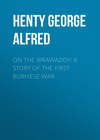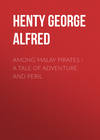Czytaj książkę: «On the Irrawaddy: A Story of the First Burmese War», strona 4
Stanley saw that there had really been no great occasion for him to stain his skin, as the people were, for the most part, lighter in colour than the Hindoos. Many of the men had, however, stained their faces to a darker colour; and all were tattooed, more or less. Men, women, and children were all smoking; and frequently, when both hands were required for any purpose, thrust their cigars into the large holes bored in the lobes of their ears. Both men and women were somewhat short in stature, but squarely built and muscular and, in the majority of cases, inclined to be fat.
The men wore a sort of kilt, consisting of a double piece of cloth, wrapped round the body and falling to the knee. Over this was a loose tunic, with sleeves open in front. The headdress was a scanty white turban.
The dress of the women was somewhat similar to that of the Hindoos, consisting of a single garment like a sheet wrapped round the body, fastening under the arms and falling to the ankles. Those of the upper classes were more elaborate. The rank among the women was distinguished, so Stanley's guide pointed out to him, by the manner in which the hair was plaited and twisted, and by the ornaments in it.
The men, like the women, wore their hair long but, while the men wore theirs in a knot at the top of the head, the women gathered it in at the back. Their faces were broad at the cheekbones, but narrowed in sharply, both at the forehead and chin. The narrow and oblique eyes showed the relationship between the Burmese and their Chinese neighbours. They seemed to Stanley a light-hearted, merry people, going about their business with much chatter and laughter; and the sound of musical instruments could often be heard, inside the houses. Several men, in bright yellow garments, mingled with the crowds in the market. These were priests, the officer told him; and it would be a mortal act of sacrilege, were anyone else to wear that colour.
Stanley remarked upon seeing so few soldiers, and the officer told him that there was no regular army in Burma. Every man capable of carrying arms was obliged to serve in case of war but, with the exception of the king's bodyguard, and a very small body of men who were police, rather than soldiers, there was no force permanently kept up. Every man was expected to know something of military duty, and all were able to build stockades. From the fact that the flesh of wild fowl formed one of the principal articles of food, the peasantry throughout the country were all accustomed to the use of the gun, and were fair marksmen.
"But you yourself are an officer," Stanley said.
"At present, yes; but tomorrow I may return to my land. It is the same with the highest minister. One day he may be a trader but, if recommended to the king as one possessing ability, straightway he is chosen to be a high official. If he does not please the king, or fails in his duties, then the next day he may be selling cloth in the bazaar again.
"Everything is at the will of the king. Nobody is born with fortune or rank, for everything belongs to the king and, at a man's death, all goes back to him. Thus everyone in the land has an equal chance. In war the bravest becomes a general, in peace the cleverest is chosen as a councillor."
Walking about, Stanley soon found that there were a great variety of dialects talked in the streets, and that the language of the Burmese of the coast, of the natives of Pegu and the central province, and of those from districts bordering on the Shan states or the frontiers of China, differed as widely as those of the most remote parts of Great Britain did from each other. This being so, he was convinced that there would be no difficulty, whatever, in passing as a native, without attracting any observation or inquiry, so far as the language went.
His features and, still more, the shape of his face might, however, be noticed by the first comer, in the daytime. He thought, indeed, that a little tinge of colour in the corner of the eyes, so as to lengthen their appearance and give an oblique cast to them, would make a difference. The general shape of the head was unalterable, but the Burmese nose and mouth did not differ very greatly from the European; except that the nostrils were smaller and, in shape, were round rather than oval.
For three weeks he continued the same life, and then the Burmese officer, with whom he had now become very friendly, said when he entered one morning:
"You must not go out today. There is news that your people have made two forward marches. The first was against a stockade, which they took, and killed many of our men; the other time they marched out four or five miles, had a fight with our troops, and again killed many. These things have angered the king and the people. Of course it is nothing, for our troops are only beginning to assemble; but it is considered insolent in the extreme, and the king's face is darkened against your countrymen. Four of the prisoners have been taken out this morning and publicly executed and, if the news of another defeat comes, I fear that it will be very dangerous, even for you."
"What had I best do, my friend?"
"I would fain save you, for we have come to know each other; and I see that there is much good in your ways, though they differ greatly from ours. Were I to take you out, as usual, you might be killed in the streets; were you to slip away and escape, I should assuredly be put to death; but if in any way I can help you, I would fain do so. My relation who brought you up here left, a fortnight since, to rejoin Bandoola; so his influence cannot serve you.
"I do not say that you might not escape from this prison–since you are not, like the others, confined in a dungeon–but I see not what you could do, or where you could go. Were you to disappear, orders would be sent down the river to every village, and every passing craft would be examined, and you would be sure to be detected; while it would be well-nigh impossible to travel the country on foot, for it is but thinly inhabited. There are often very long distances between the villages, and much of the country is swamp and forest, without paths; for the village trade goes by the river, and they have little communication with each other.
"I know that, from what you say, you think that your troops will beat ours, even when we assemble in large numbers. Were this so, I fear that there would be little chance of your life being spared. Were it not for that, I should say that, Bandoola having recommended you, you would be in no danger here, and had better remain until peace is made.
"What think you, yourself?"
"It is very difficult to reply, at once," Stanley said, "but I thank you greatly for your offer to befriend me, in any way you can. I do not say that I had not thought of escape, for I have of course done so. But it seemed to me a thing in the distance; and that, at any rate until the rains were over and the rivers had sunk, it would be useless to attempt it. I see, now, that it will be safest for me to try without delay. If you will come in again, this afternoon, I will tell you what I have thought of."
"I will do so; and I, myself, will try to think how best the matter can be managed. We must remember that the great thing is for you to find concealment, for the present. After the search for you has been made for some time, it will die away; and it will then be the easiest plan for you to make your way down the river."
Chapter 4: A Ruined Temple
After the officer left him, Stanley sat thinking for a long time. He himself inclined strongly towards the river; but he saw that, at present, the difficulties would be very great. The war boats were passing up and down, and bodies of troops were being carried down in large craft. In every village the men, he knew, were assembling and drilling. Even in Ava he could see the difference in the population, the proportion of men to women having markedly decreased since his arrival.
As to the journey by land, it appeared to him impossible. He was, too, altogether without money and, whether by water or land, it would be necessary to go into the villages to buy provisions. Indeed, money would have been almost useless, for there was no coined money in Burma; payments being made in lead, for small amounts, or in silver for large ones–the quantity necessary being cut off from small sticks or bars, or paid in filings.
It seemed to him that the best thing would be to take to the forest, for a time; and endeavour to subsist upon wild fruits or, if these were not to be found there, to go out into the fields and orchards at night, and so manage to hold on for a few weeks. His friend told him that, in the forests along the principal lines of route to the capital, were many bad characters–persons who had committed crime and fled from justice. Some were cultivators who, having been unable to pay their taxes, had deserted their land and taken to the woods. All committed depredations, and traders coming into the town from the Shan states, or from the country where rubies and emeralds were found, always travelled in caravans for mutual protection. At times levies were called out, and many of these marauders were killed.
Stanley, then, had hit upon nothing definite when the officer returned in the afternoon and, in reply to the latter's question, he acknowledged at once that the only thing he could see was to take to the forest, until the active search for him had ceased.
"You would find it difficult to maintain yourself. I have thought of a better way than that. I am acquainted with a Phongee, who lives in a temple in a lonely spot, four miles away. He is a good man, though somewhat strange in his habits; and I feel sure that, on my recommendation, he would take you in. There would be little chance of your being discovered there. You could not go dressed as you are, but must disguise yourself as a peasant; though it might be well to retain your present attire, which may be useful to you, afterwards. I fear that you will fare badly with him, in the way of food; there will be enough to eat, but it will be of the simplest."
"So that there is enough to keep life together, it matters little what it is."
"Then that is settled.
"Now, about making your escape from here. Your door is closely barred, at night; and there is no window save those four little holes, high up in the wall, which scarce a bird could get through."
"I could cut through the thatch above," Stanley said, "if I had but something that I could stand upon to do so. There are some bamboos lying just at the bottom of the steps. With these and some cord I might make a sort of ladder, and should then be able to get at the thatch."
"I will bring you some cord, tomorrow, for that and to let yourself down to the ground. Then I will arrange where to meet you, and will guide you out of the town and take you to the priest. I will bring a disguise for you, and some stain for your body and arms for, as a peasant, you would be naked to the waist. I can think of nothing better."
"I thank you most heartily," Stanley said, "and trust that you may get into no trouble for the kindness that you have shown me."
"There is no fear of that, my friend. No one will know that I have been away from the town. I am greatly afraid that this will be all that I shall be able to do for you; for I am told that I am to go down the river with the next batch of troops, which will start in three days. I have only been informed of it since I saw you this morning. Had it not been for you I should have been glad; for it is in war time, only, that one can obtain honour and promotion."
"I am sorry that you are going, sir. I shall miss your kindness, sorely; but I can understand your desire to go to the front. It is the same with us; when there is a war, every officer and soldier hopes that his regiment will be sent there. However, I shall see you again.
"Has Bandoola's army moved yet?"
"No; nor do I think that it will do so. It is a long march down to Rangoon from Ramoo; and I believe that he will remain where he is, until he sees how matters go at Rangoon. As soon as your people are driven out, he will be joined by a great army, and will march to Dacca. There our troops from the north will join him; and then he will go to India, we think."
"I fancy," Stanley said with a smile, "if he waits until we are turned out from Rangoon, his stay at Ramoo will be a long one."
The next day the officer brought several yards of strong cloth, such as was worn by the peasants; a piece of muslin to make the circular band that was worn by the lower class, instead of a complete turban; and a lot of horse hair to be worn on the top of the head.
"Now," he said, "strip to the waist, and I will dye your body. I have dyes of two colours here; one for the skin, and the other to draw lines on the face, so as to make you look older; and with this I can also imitate tattoo marks on your chest and shoulders. Here is a long knife, such as everyone wears, and here is the cord.
"As soon as it is getting dark you must carry up two of the bamboo poles, taking care that no one observes you do so. There is seldom anyone in the courtyard. I have had the knife sharpened, and it will cut through the thatch, easily enough. When you get away, walk straight to the market that lies nearest to us. I will be at its entrance. It will take you, I suppose, two hours to make your ladder and get out. You cannot begin until the guard closes your door. You tell me he never comes in."
"No, he brings the last meal an hour before sunset. I generally sit on the top of the steps, till he comes up to lock the door, which is about nine o'clock; and I do not see him again until he unbars the door in the morning. I should not think that it will take as long as two hours to make the ladder, and cut the thatch; at any rate, by eleven I ought to join you.
"I suppose the gates are open."
"Oh, yes! They are never closed, though of course they would be, if an enemy were near. There is no guard anywhere."
After staining Stanley's skin, the officer waited a quarter of an hour for it to dry thoroughly; and then proceeded to draw lines on his face, across the forehead, and from the corners of his eyes; and then spent nearly an hour in executing rough tattoo marks on his body and arms.
"This dye is very good, and will last for weeks before it begins to fade. I will bring with me another bottle, tonight, so that you can at least re-dye your skin.
"Here is some wax. You must turn your hair up from the neck, and plaster it in its place with it. The turban will prevent anyone seeing how short the hair is. Here is a little bottle of black dye, with which you had better colour it, before fixing it with the wax."
Stanley's hair had not been cut for some time before he had been captured by the Burmese and, in the two months that had since elapsed, it had grown very long; and could therefore be turned up as the officer suggested. Putting on his usual garments, he sat at his place, at the door of the cell, until the guard brought up his evening meal. Having eaten this, he dyed his hair and, half an hour later, turned it up, plastering it with wax, and tied a bit of fibre round where the turban would come.
By this time it was getting dusk. He sat at the door at the top of the steps, until he saw that the courtyard was deserted; the guard at the gate having gone outside, to enjoy the coolness of the air. Then he ran down the steps, took two bamboo poles about ten feet in length, and two short pieces of the same wood no thicker than his finger and, hurrying up the steps with them, laid them down against the side of the room. Then he went to the steps again, and sat there until he saw the guard coming across to fasten his door; when he went in and, as soon as he heard the bars put up, began his preparations.
First he lashed the short pieces across the ends of the two bamboos, so as to keep them a foot apart; then he put ratlines across, and soon had the ladder completed. He made up his clothes into a bundle, wrapped the rough cloth round his waist, adjusted the knot of horse hair on the top of his head, and fastened it there with wax. He wound the turban round below, and his disguise was complete.
Fixing the ladder against the wall he climbed it, and it was not long before he cut a hole through the thatch of sufficient size to pass out. The work had taken him longer than he had expected, for it had to be done in absolute darkness; however, he was sure that he was well within his time. Fastening the end of the rope to one of the bamboo rafters, he descended the ladder and picked up his bundle; then climbed up again, got halfway out of the hole, and listened intently. Everything was quiet in the street and, in another minute, he stood on the ground.
When he turned into the principal street, there were still many people about. Sounds of music and singing came from the windows, for the Burmese are very fond of music, and often pass the whole night in playing and singing. There was no risk whatever of detection now, and he stepped briskly along until he came to the open space, with its rows of little thatched huts. Here he paused for a minute, and the officer stepped out from behind a house and joined him.
"I was not sure at first that it was you," he said. "Your disguise is excellent. You had better follow me, now, until we get beyond the busy streets."
Keeping some twenty yards behind his guide, Stanley went on until, after nearly half an hour's walking, they passed through a gate in the city walls. He now closed up to the officer and, after another half-hour's walk across a cultivated country, they entered a forest. The ground now rose steadily and, after keeping on for two miles, they emerged from the trees at the top of a hill. The space had been cleared of timber, but it was nearly covered with bushes and young trees. In the centre were the ruins of a temple, that had evidently existed long before the Burmese dynasty occupied the country, and had been erected by some older race. It was roofless; the walls had, in places, fallen; and the ruins were covered with vegetation.
The Burman ascended some broken steps, entered the temple, and crossed to one of the opposite corners. A dim light was burning in a small apartment, which had been roofed with thatch. A man was lying, dressed, on a heap of leaves at one side. He started up as the officer entered.
"Who is it who comes here at this hour?" he asked.
"Thekyn," the officer answered.
"I am glad to see you," the Phongee said, "whatever may bring you here. You have not fallen into trouble, I hope?"
"In no way, good priest. I am starting, in two days, down the river to fight the barbarians; but before I go, I want you to do me a favour."
The Phongee smiled.
"Beyond naming you in my prayers, Thekyn, there is but little that a hermit can do for any man."
"Not so, in this case," the officer said. "I have one here with me who needs rest, and concealment. I would rather that you did not ask who he is. He has done no crime, and yet he is in danger; and for a month, maybe, he needs a shelter. Will you give it him, for my sake?"
"Assuredly I will," the priest said. "Your father was one of my dearest friends, in the days when I dwelt in the city. I would gladly do all in my power for his son, and this is but a small thing that you ask. Let him enter."
Stanley went in. The priest took down the little lamp, from a shelf on which it stood, and held it near the lad's face. Then he turned, with a smile, to Thekyn:
"The painting is but clumsily done," he said, "though maybe it would pass without close examination. He is a stranger, and comes of a race unknown to me but, as you said, it matters not to me who he is; suffice that he is a friend of yours. He is welcome to a share of my shelter, and my food; though the shelter is rough, and the food somewhat scanty. Of late few, indeed, have sought me for, as I hear, most of the men have gone down to the war."
"I have brought you some food," the officer said; for Stanley had observed that he also carried a bundle, a larger one than his own. "Here is a supply of rice, that will last for some time; and this, with your offerings, will suffice to keep things going. My friend is not, like you, bound by his religion not to take life; and I know that snakes are very plentiful round here."
Snakes had formed a frequent article of his diet, since he had been captured; and Stanley had lost the repugnance to them that he at first felt, so the prospect of their forming the staple of his food was not disagreeable to him. It would also afford him some employment to search for and kill them.
"I shall be well content," he said, "with anything that I can get, and trust that I shall be no burden upon you."
"You will assuredly be none," the priest replied. "Here must be at least thirty pounds of rice which, alone, would keep two men alive for a month. As regards the snakes, though I may not kill them, I may eat them when killed; and indeed, there are few things better. In truth, I should not be sorry to have some of the creatures out of the way; for they swarm round here so thickly that I have to pay great heed, when I walk, lest I step upon them."
"Have you been troubled with robbers, of late, father?" Thekyn asked.
"They trouble me not at all," the priest said. "Men come, sometimes. They may be robbers, or they may not. I ask no questions. They sometimes bring fruit and other offerings, and I know that I need not fear them. I have nought to lose, save my life; and he would be indeed an evil man who would dare to lift his finger against a priest–one who harms not anyone, and is ready to share what food he has with any man who comes to him hungry."
"Well, father, I will say goodbye. I must be back to the city before men are about, as I would not that my absence should be discovered."
"Peace be with you, my son. May you come back safe from the wars. My prayers will be said for you, night and morning.
"Be in no uneasiness as to your friend. If any should ask me about my companion, I shall reply that he is one who has undertaken to rid me of some of the snakes, who dispute the possession of this place with me."
Thekyn motioned to Stanley to come outside the hut with him and, when he did so, handed to him a small but heavy bag.
"This is lead," he said. "You will need it, when you start on your journey down the country. There are eight pounds of it and, from what you have seen in the market, you will know how much food can be got for a small amount of lead. I would that I could do more for you, and assist your flight."
"You have done much indeed, very much and, should I regain my friends, I will endeavour to do as much by one of your countrymen, for your sake. I hope that, when this war is over, I may meet you again."
"I hope so," the Burman said warmly. "I cannot but think that you will succeed in getting away."
"My son," the old priest said, when Stanley returned to his cell, "I am going to my prayers. I always rise at this hour, and pray till morning; therefore you may as well lay yourself down on these leaves. There is another cell, like this, in the opposite corner of the temple. In the morning you can cut boughs, and roof it like this; and make your bed there. There is no room for another, here; and it will doubtless be more pleasant for you to have a place to yourself, where you can go and come as you like; for in the day women come up to consult me, and ask for my prayers–but mind how you enter it for the first time as, like as not, there will be snakes sheltering there."
Stanley lay awake for a time, listening to the monotonous voice of the priest as he repeated his prayers; but his senses soon wandered, and he slept soundly till daybreak.
His first step was to cut a stout stick, and he then proceeded to the other cell, which was partially blocked up with stone from the fallen roof. It took him two hours to carry this stuff out, and he killed no less than nine snakes that he disturbed in his work. The prospect of sleeping in a place so frequented was not a pleasant one, especially as the cell had no door to it; and he resolved at once to erect some sort of bed place, where he might be beyond their reach. For this purpose he cut two poles, each three or four inches longer than the cell. One end of each he sharpened, and drove in between the interstices of the stone, at a distance of some two feet and a half apart and four feet from the ground. The other ends he hammered with a heavy stone against the opposite wall, until they would go down no farther. Then he split up some more wood and lashed strips, almost touching each other, underneath the two poles, by the aid of some strong creepers. Then he filled up the bed place, between the poles, with dry leaves.
One end of the bed was some inches higher than the other. This was immaterial, and he felt satisfied that even the craftiest snake could not reach him.
As to the roof, he was by no means particular about it. In this part of Burma the rainfall is very small, the inundations being the effect of heavy rains in the distant hill country which, as they come down, raise the level of the rivers, in some cases, as much as eighteen feet, and overflow the low-lying country.
Before beginning to construct the bed, he had carried the snakes into the Phongee; after first cutting off their heads which, as he knew, the Burmans never touch.
"This is good, indeed, my son," the priest said. "Here we have our breakfast and dinner. I will boil some rice, and fry four of them for breakfast."
The bed was but half completed, when he heard the priest sound a bell. It was doubtless used as a call to prayer. However, Stanley rightly conjectured that, in this case, it was a summons to a meal; and was soon seated on the ground by the side of the priest. Little was said at breakfast, which Stanley enjoyed heartily.
"So my friend Thekyn is starting for the wars. What think you of it, my son? Shall we easily overpower these barbarians? We have never met them in war before and, doubtless, their methods of fighting are different from ours."
"Quite different. Their men are trained as soldiers. They act as one man, while the Burmese fight each for himself. Then they have cannon with them, which they can drag about quickly, and use with great effect. Although they are few, in comparison with the armies going down to attack them, the latter will find it very difficult work to turn them out of Rangoon."
"Do you think that they will beat us, then?"
"That I cannot say, but I should not be surprised if it were to prove so."
"The Burmese have never been beaten yet," the priest said. "They have been victorious over all their enemies."
"The Burmese are very brave," Stanley agreed, "but, hitherto, they have only fought against people less warlike than themselves. Now they have to deal with a nation that has made war a study, and which always keeps up a large army of men who are trained to fight, and who spend all their time in military exercises. It is not that they are stronger than the Burmese, for the Burmese are very strong men; but only that men who are trained to act together must, necessarily, possess a great advantage over those who have had no such training–who simply take up arms for the occasion and, when the trouble is over, return to their homes and lay them by, until called out to fight again.
"Besides, their weapons are better than yours; and they have many cannon which, by practice, they can load and fire very quickly; and each of which, when the armies are near each other, can fire fifty or sixty bullets at once."
"I have heard a strange story that the barbarians have a ship without sails, with a great chimney that pours out quantities of black smoke, and a wheel on each side and, as the wheels move round, the vessel can go straight up the river against the tide, even if the wind is blowing strongly down."
"It is true, father, there are many such ships; but only two or three that have made the long voyage across stormy seas to India."
"It is wonderful how these men can force fire to be their servant, and how it can make the wheels of the ship to move round."
"That I cannot tell you, father. I have never seen one of these vessels, though I have heard of them."
The priest said no more, but evidently fell into a profound meditation; and Stanley, getting quietly up, returned to his work. The priest came in, just as he had completed his bed.
"That is well," he said, looking at it approvingly. "I myself, although I know that, until my time has come, no creature can harm me, cannot resist a shudder when I hear one rustling amid the leaves of my bed; for they come in, although some of my friends have had a door placed to exclude their entry at night. I wander but little from my cell, and always close the door after me; but they enter, sometimes, when I am meditating, and forgetful of earthly matters, and the first I know of their presence is the rustling of the leaves in the bed, at night. Were I as strong in faith as I should be, I would heed it not. I tell myself so; but my fear is stronger than my will, and I am forced to rise, turn up the leaves with a stick until I find them, and then I open the door and eject them, with as much gentleness as may be."
"I should get no sleep at all," Stanley said. "I don't think that even a door would make me feel any safer, for I might forget to shut it, sometimes. Tomorrow, father, I will wage war with them, and see if I cannot decrease their numbers considerably."
Stanley's first task was to clear the bushes away from the court of the temple; and this, after several days' hard work, he carried out; although he soon saw that by so doing he would not diminish the number of the snakes, for the greater portion of the area was covered with blocks of fallen stone, among which the reptiles found an impenetrable shelter. The clearance effected, however, was so far useful that, while the creatures were before altogether hidden from sight by the bushes, they could now be killed when they came out to bask in the sun on the uncovered stones; and he could, every day, destroy a dozen or more without the slightest difficulty.




















